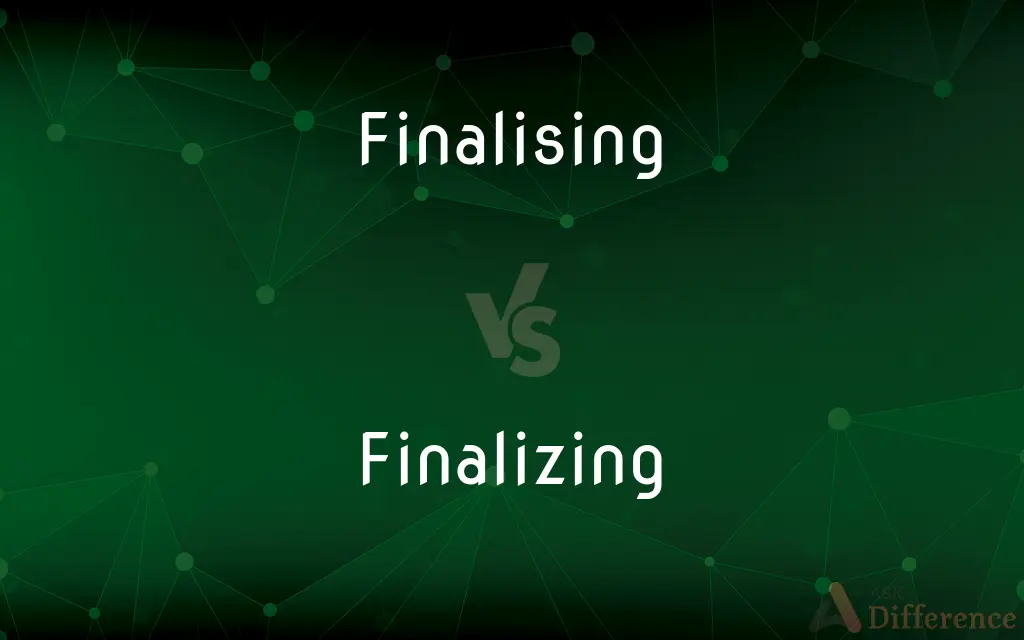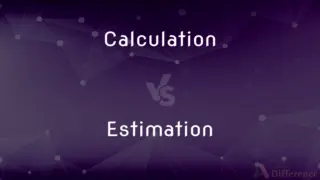Finalising vs. Finalizing — What's the Difference?
By Tayyaba Rehman — Published on October 4, 2023
Finalising" and "Finalizing" mean completing the last part of a task, with the former being British English spelling, and the latter American English spelling.

Difference Between Finalising and Finalizing
Table of Contents
ADVERTISEMENT
Key Differences
Finalising and finalizing essentially have the same meaning, referring to the process of completing or concluding an activity, task, or project, making it final. "Finalising" is primarily used in British English and follows the British English spelling convention. It represents the act of bringing something to a conclusion or completion, ensuring all aspects are settled, and no further work is required. This word is commonly used in various contexts, such as finalising a deal, a document, or plans, implying the conclusion of proceedings or negotiations.
"Finalizing," conversely, is the American English spelling of the word, and it adheres to the American English spelling convention. It denotes the same act of completing or concluding something to make it final. It implies the ending of a process by resolving all outstanding issues or by completing the remaining tasks. Like "finalising," "finalizing" can be used in multiple contexts, representing the completion of tasks, agreements, or projects.
While both "finalising" and "finalizing" refer to the same concept and action, the difference in spelling corresponds to different dialects of English. The choice between "finalising" and "finalizing" depends largely on the regional language standards and the intended audience's preference. Consistency in the use of British or American English spelling is crucial in formal writing contexts to maintain the text's uniformity and coherence.
"Finalising" and "finalizing" serve as synonyms, interchangeable based on the regional language preference, but essential in conveying the notion of bringing something to completion or fruition. The subtle difference in spelling does not impact the overall understanding of the word, as both represent the concluding actions to settle, complete, and finalize matters.
Comparison Chart
Spelling
British English spelling with “-ise”
American English spelling with “-ize”
ADVERTISEMENT
Meaning
Completing the last part of a task
Completing the last part of a task
Usage
Predominantly used in British English regions
Predominantly used in American English regions
Application
Applied in the same contexts as "finalizing"
Applied in the same contexts as "finalising"
Functionality
Serves the same function as "finalizing"
Serves the same function as "finalising"
Compare with Definitions
Finalising
Finalising means bringing something to a conclusion.
We are finalising the details of the agreement.
Finalizing
Finalizing means resolving all remaining aspects of something to make it final.
She is finalizing the design of the website.
Finalising
Finalising involves completing the remaining parts of a task.
She is finalising her thesis this week.
Finalizing
Finalizing refers to completing or concluding an activity or task.
The team is finalizing the project.
Finalising
Finalising implies ensuring no further work is required on a task.
He is finalising the preparations for the event.
Finalizing
Finalizing involves making the last adjustments or revisions to complete something.
They are finalizing the manuscript for publication.
Finalising
Finalising denotes settling all outstanding issues.
They are finalising the terms of the contract.
Finalizing
Finalizing implies completing the outstanding parts of a task or project.
We are finalizing the plans for the new building.
Finalising
Finalising represents making final adjustments to complete something.
We are finalising the schedule for the conference.
Finalizing
Finalizing denotes bringing something to a state where no further work is needed.
He is finalizing the budget for the next fiscal year.
Finalising
Present participle of finalise
Finalizing
To put into final form; complete.
Finalizing
Present participle of finalize
Common Curiosities
Do "finalising" and "finalizing" have the same meaning?
Yes, they mean completing the last part of a task; the difference is in regional spelling.
Are "finalising" and "finalizing" used in formal writing?
Yes, both terms are used in formal writing to denote the completion or conclusion of a task or project.
Can "finalising" and "finalizing" be used interchangeably?
They can be used interchangeably, but it's important to consider the audience and maintain consistency in spelling.
Should one prefer "finalising" over "finalizing" in the UK?
Yes, in the UK, "finalising" would typically be the preferred spelling.
Is "finalising" British English?
Yes, "finalising" follows British English spelling conventions.
Is "finalizing" more commonly used in the United States?
Yes, "finalizing" is the conventional spelling in the United States.
Is "finalizing" the American English variant?
Yes, "finalizing" is the spelling used in American English.
Can "finalizing" represent the action of making final adjustments to something?
Yes, "finalizing" often represents making the last adjustments or revisions to complete something.
Is "finalising" a more neutral term?
"Finalising" and "finalizing" are equally neutral; the difference is only in the regional spelling preference.
Can "finalizing" be used to denote the completion of any task or project?
Yes, "finalizing" can be used broadly to denote the completion or conclusion of various tasks or projects.
Does "finalising" imply the conclusion of proceedings or negotiations?
Yes, "finalising" often implies the conclusion of proceedings, negotiations, or outstanding issues.
Share Your Discovery

Previous Comparison
Glass Ceiling vs. Concrete Ceiling
Next Comparison
Calculation vs. EstimationAuthor Spotlight
Written by
Tayyaba RehmanTayyaba Rehman is a distinguished writer, currently serving as a primary contributor to askdifference.com. As a researcher in semantics and etymology, Tayyaba's passion for the complexity of languages and their distinctions has found a perfect home on the platform. Tayyaba delves into the intricacies of language, distinguishing between commonly confused words and phrases, thereby providing clarity for readers worldwide.











































